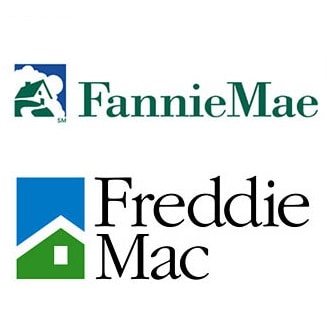Implement AEI-Heritage-R Street GSE Plan AND Honor Shareholder Contracts

 Recent “draws” from the Treasury Department—i.e., taxpayer bailouts—for the government-sponsored enterprises (GSEs) Fannie Mae and Freddie Mac show the pressing need for reform of these quasi-governmental entities tasked with buying mortgages from banks in an attempt to encourage home ownership. Though the “draws” were not as large as some of the big ones we were made used to in the not-so-long-ago age of financial bailouts, they illustrate the vulnerability of the GSEs—and by extension, the taxpayers who are backing them—to the slightest economic volatility.
Recent “draws” from the Treasury Department—i.e., taxpayer bailouts—for the government-sponsored enterprises (GSEs) Fannie Mae and Freddie Mac show the pressing need for reform of these quasi-governmental entities tasked with buying mortgages from banks in an attempt to encourage home ownership. Though the “draws” were not as large as some of the big ones we were made used to in the not-so-long-ago age of financial bailouts, they illustrate the vulnerability of the GSEs—and by extension, the taxpayers who are backing them—to the slightest economic volatility.
So it is welcome news that our friends from the American Enterprise Institute, Heritage Foundation, and the R Street Institute put forth a plan this week for the Trump administration to take steps to downsize the GSEs. Noting the deadlock in Congress over GSE reform—even among Republicans—the paper looked exclusively at options that don’t require congressional authorization.
The Taxpayer Protection Housing Finance Plan, as it is called, contains some useful steps for winding down Fannie and Freddie and covers some of the same ground as I did in my recent OnPoint issue brief on phasing out the GSEs. But the new plan’s recommendations are incomplete. To really reduce the government’s footprint in housing and to ensure private firms pick up the slack, the U.S. must honor the contracts Fannie and Freddie made with its private sector shareholders.
The new paper calls for gradually reducing the conforming loan limits—the maximum size of mortgages that Fannie and Freddie can buy from banks—from the current limit of about $450,000 by about 20 percent each year for three years. It also calls for eliminating the GSEs’ purchase of investor loans and second-home loans, so that the GSEs are only in the business of buying mortgages for personal residences.
The authors of the paper effectively counter claims that downsizing or phasing out the GSEs would, by itself, devastate the housing market. “There is compelling evidence that the financial crisis did not cause securitizers and investors to shun the securitization market in general, only those markets where competition from government agencies [such as the GSEs] was the greatest,” they write. “Most of the other major asset securitization markets— the commercial MBS sector, (consisting of office, lodging, and retail, but excluding multifamily) and the Asset Backed Securities (ABS) sector (consisting of credit cards, auto loans, and business loans)—have, post-crisis, generally recovered so that they are approaching 2001-2004 levels.”
The plan also requires that the GSEs have as strong a capital cushion as other firms the government has designated as “systemically important financial institutions” (SIFIs) under the Dodd-Frank Act. This is in sharp contrast to the current situation in which the Obama Administration’s Third Amendment mandates that the GSEs operate with virtually no capital and that 100 percent of their profits be remitted immediately to the Treasury Department. The recent “draws” from the Treasury Department shows that the Third Amendment has served neither taxpayers nor the GSEs’ shareholders well.
And rectifying the ill treatment of shareholders, as well as taxpayers, is what’s needed to get the private sector back into the mortgage securitization market. As I write in my CEI OnPoint: “If investors see any market as prone to arbitrary government takeovers, they will be very reluctant to invest in this sector. Investors will not buy into a transitional privatization scheme, if they think the government can abrogate their property rights at the first sign of things going south.”
As of late last year, the GSEs had remitted to the U.S. Treasury about 50 percent more than the government had lent them, a $270 billion payment for a $187.5 billion cash infusion. Several lawsuits charge that this is an illegal expropriation under the “Takings Clause” and other provisions of the Constitution and federal law. In my paper, I propose a bipartisan commission to determine appropriate compensation for shareholders as Fannie and Freddie are wound down.
And both my paper and the “Taxpayer Protection” plan recognize the importance of regulatory relief in getting more private firms into the mortgage market. Dodd-Frank’s “qualified mortgage” rule and “Volcker Rule,” from which government agencies like the GSEs are largely exempt, put the private sector at a substantial disadvantage in the mortgage market. The bipartisan Senate banking bill that will be voted on soon provides some needed relief from these Dodd-Frank provisions, and agencies charged with enforcing them should provide further relief allowed by law.
Winding down the GSEs goes hand in hand with winding down onerous regulation and restoring the property rights of shareholders.